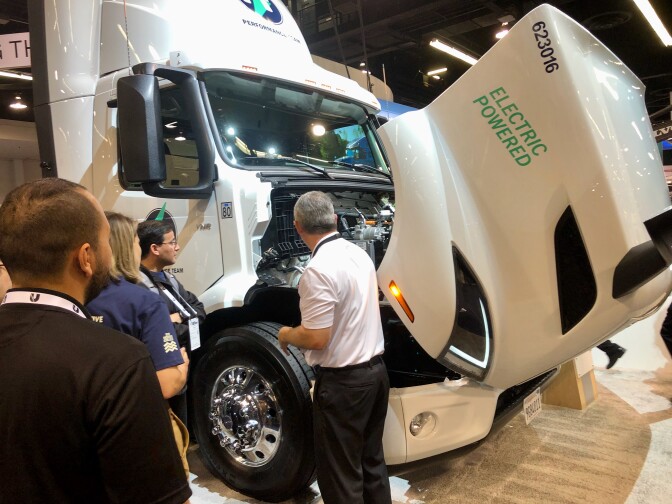This story is free to read because readers choose to support LAist. If you find value in independent local reporting, make a donation to power our newsroom today.
California Strikes Deal With Truck Makers To Move Forward On Electrification Plans

California and the world’s leading truck manufacturers have come to an agreement to help avoid legal roadblocks and smooth the way to electric medium- and heavy-duty trucks.
The deal comes between the California Air Resources Board (CARB), the Truck and Engine Manufacturer’s Association, and leading truck manufacturers, including Volvo and Daimler. The agreement says they will meet California’s first-in-world policy to stop selling diesel and gas big rig trucks by 2036, regardless of any legal battles that may come up to slow the policy.
In return, CARB will modify some air pollution requirements in the policy, including pushing a 2024 emission standard to 2027 to align with federal rules.
California’s landmark electric car policies faced lawsuits from the auto industry and rollbacks from the Trump Administration (that were later restored by the Biden Administration). The newer medium- and heavy-duty truck rules have faced resistance from the truck industry as well.
Why it matters
Medium- and heavy-duty trucks make up only 6% of vehicles on California roads, but they spew about 9% of the state’s total greenhouse gas emissions and nearly half the pollutants that cause smog, according to CARB.
“This agreement shows that even the truck makers agree that we're all headed towards a zero emissions future for trucking in this country and that momentum is just undeniable at this point,” said Yasmine Agelidis, a senior associate attorney with nonprofit environmental law group, Earthjustice.
At the same time, she said, a less-strict air emission standard is “disappointing and concerning.”
Agelidis said the agreement could also be an incentive for more government funding to go to all-electric trucks, rather than hydrogen or “low-carbon” technologies. She said the state’s Low Carbon Fuel Standard, a program that aims to incentivize low-carbon-emission technology, could be overhauled to funnel funding to zero-carbon, fully electric technology.








